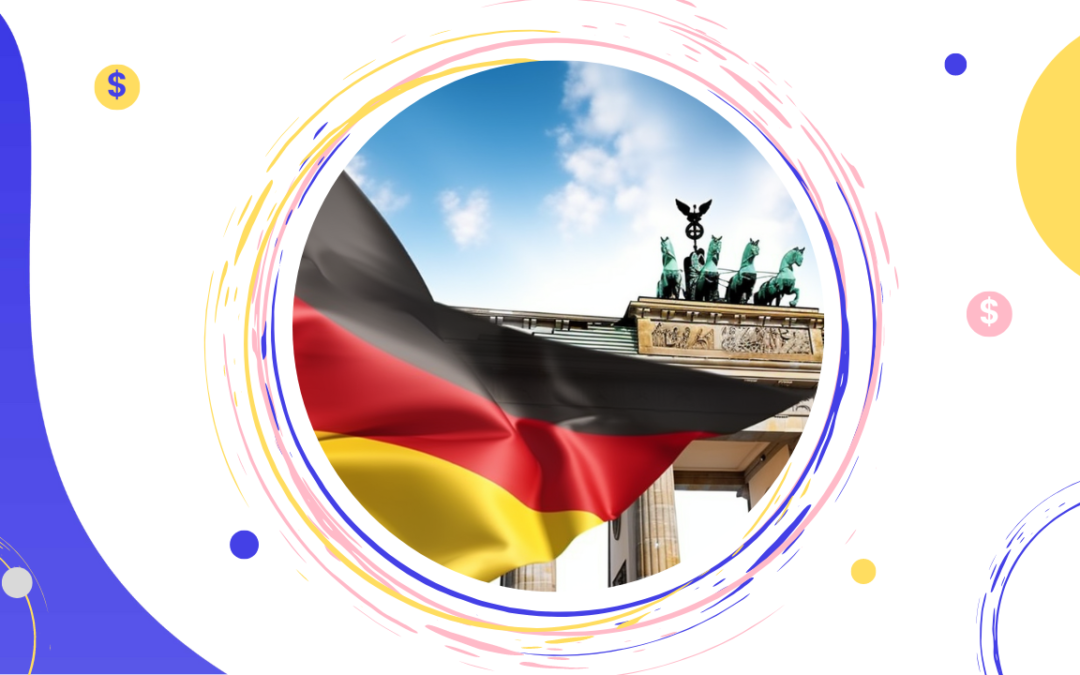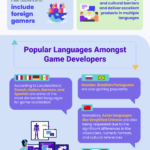Moin, Moin! Or should we better say “Hallo”? Translation and localization are crucial for reaching the German audience effectively. Despite originally being a rather PC-oriented gaming market, Germany has always been a gaming bastion. In this article, we want to give you insights into what German players expect from game studios.
We also want to advocate the importance of providing high-quality German translation that can be a make-or-break argument for most players. Eliminating linguistic barriers will not only facilitate Germans to buy and enjoy your game. It also shows your gamers that you care about them. And most importantly: You increase the likelihood that they stay loyal to your game and brand.
Table of contents
- German Gaming Market
- In-Game Purchases in the German Gaming Market
- Formal and Informal Styles in German Game Translation
- The Significance of Word Length in Game Design
- Anglicisms in German Game Localization
- Non-Standard Interface Translations
- Payment Methods in Germany
- Navigating Culturally Sensitive Topics
- Data Privacy and Consumer Protection
- Conclusion
German Gaming Market
Gaming is a significant market in Germany, ranking as the fifth-largest globally in 2022, according to Newzoo. The country boasts a large community of game enthusiasts, with seven out of ten Germans identifying as such. Among consumers, countless gaming studios and nearly 800 companies are involved in game development and publishing, with 28,000 staff employed by the industry.
Needless to say, the biggest gaming convention in Europe, the Gamescom, is annually held in Cologne, North-Rhine Westphalia. It attracts hundreds of thousands of avid gamers and devs to connect and share sneak peeks of upcoming releases.
Statista Highlights at a Glance:
- The projection for revenue in the Video Games industry is US$7.79bn for 2023.
- The industry is expected to grow 7.63% annually between 2023-2027. This growth is projected to result in a market volume of US$10.45bn by 2027.
- The number of users in the industry is expected to reach 35.60 million by 2027. In 2023, the user penetration rate is projected to be 39.4%, rising to 42.7% by 2027.
- Regarding global comparison, China is projected to generate the most revenue (US$107,300.00 m in 2023).
- The average revenue per user (ARPU) will be US$236.00 for the Video Games industry in 2023.
- Mobile Games are the industry’s largest segment, with a market volume of US$6.19bn projected for 2023.
Mobile Gaming in Germany
Mobile is the most common gaming platforms in Germany, with the largest revenue stream being generated from this sector. It is now widely accessible due to the prevalence of smartphones and tablets. This has made it an important part of the German gaming market.
Console Gaming and PC Gaming
Console and PC gaming also represent significant portions of the German gaming market. 34 million Germans play video and computer games, with 36% playing regularly and 42% playing occasionally. The average German gamer is 37.5 years old, showing that gaming appeals to a wide age range in the country.
VR Gaming
Virtual reality gaming is growing in Germany. Technologies like the Oculus Quest 2 or PSVR 2 are becoming more and more popular among gamers.
The particular data privacy backlash with Meta prevented its growth during recent years (read further below). Nonetheless, as technology advances and becomes more accessible, the VR gaming market in Germany is expected to grow.
Market Revenues and Importance
In 2019, the German gaming market’s volume was $7.5 billion, showcasing its importance within Europe and the global gaming industry. The biggest growth drivers in the German gaming market are online services and in-game purchases. As the industry continues to grow, developers can expect the German market to become even more important on a global scale.
Future Growth
The German gaming market is expected to grow in the coming years, with the government actively supporting the industry. As of August 13, 2021, the government was funding 58 projects ranging from €30,000 to €2.23 million. This investment further highlights the significance of the German gaming market and its potential for future growth.
As a result, German game localization has become a top priority for any game developer looking to expand their reach. This includes translating the text, understanding, and adjusting to the German market’s unique cultural nuances and preferences.
In-Game Purchases in the German Gaming Market
German players are known to engage in many in-game purchases, leading to the market’s overall growth and revenue. These purchases include items such as virtual goods, power-ups, and visual enhancements, which can enhance the gaming experience and generate additional revenue for developers. Compared to other markets, Germans do significantly spend more on IAPs. However, they are highly educated buyers and tend to wait for value bundles or offers than purchase right away.
According to Newzoo, gaming motivators in Germany include enhancing the gaming experience, supporting favorite games or developers, and participating in special events or promotions. German gamers are also avid consumers of game-related content such as live streams, reruns, and recordings.
Game developers can increase their profitability in the major German market by providing to the tastes of German players. They can also offer appealing in-game purchase options.
Formal and Informal Styles in German Game Translation
A unique feature of the German language sets it apart from many others: the difference between formal and informal addresses. Awareness of this difference and making appropriate choices for the game’s target audience and tone is important during German game localization.
People use the formal address (Sie) when talking to strangers, in professional situations, or with someone much older. In contrast, Germans use the informal address (Du) among friends, family members, and acquaintances. Choosing the right formality level can greatly impact player experience and immersion, making it vital for German game localization.
The Significance of Word Length in Game Design
German’s long compound words can challenge game designers, especially in mobile games with limited screen space. When translating game interfaces into German, it’s important to consider word length and adjust the design accordingly. Some approaches to address this issue include:
- Abbreviating words
- Using shorter synonyms
- Adjusting font size or line spacing
- Expanding the user interface to adapt longer text
By adapting UIs during game design, developers can create visually appealing and user-friendly localized games for German players.
Anglicisms in German Game Localization
Anglicisms, or English words and phrases, have become more common in German, particularly in technology and gaming. Still, there’s a steady public debate on how much the German language needs Anglicism, especially since older people prefer German synonyms. That is why using Anglicisms can be a double-edged sword in German localization. While Anglicisms might appeal to some younger players, they could also turn away those seeking a genuine German experience.
To strike the right balance, it is important to research the target audience and determine their preferences. Anglicisms might suit game genres with a strong English influence, like MMORPGs or esports titles.
Either way, it is important to create a player persona to determine who your main audience is. A skilled localization agency can help choose the right tone and decide between Anglicisms and their German counterparts.
Non-Standard Interface Translations
In addition to text game translation, German game localization must address the unique challenges posed by non-standard interface elements. This may include translating icons, adjusting currency symbols, or converting measurements to the metric system. It is important to work with a German translation expert.
A key consideration when releasing PC games for German players recognizes that German keyboards differ from English ones. The German keyboard features unique characters, including ä, Ä, ö, Ö, ß, ü, Ü, and a different layout. Designers should remember this when creating tutorials for localized German video games.
Also, the Ctrl button on most German keyboards is Strg, from the word Steuerungstaste.
Payment Methods in Germany
When entering the German-speaking market, it is important to consider the best payment methods for German players. Credit cards are not as popular in Germany compared to other countries. Relying only on credit card payments can limit the potential customer base.
Some popular payment methods in Germany include:
- Bank transfers, or Überweisung, are a popular form of online transactions. This method involves transferring money directly from a customer’s bank account to the merchant’s.
- Direct debit (Lastschrift): This method allows merchants to debit the customer’s bank account with authorization directly.
- Cash on delivery (Nachnahme): For physical goods, German customers may prefer to pay cash upon product delivery.
- E-wallets: Services such as PayPal, Apple Pay, and Google Pay are becoming increasingly popular in Germany for online transactions.
- Mobile payments are a handy way to shop online. Apps such as Paydirekt enable customers to pay for purchases directly from their bank accounts. All they need is a smartphone.
- Prepaid cards: Prepaid cards, such as Paysafecard, offer a secure and anonymous payment method for online transactions.
Mobile payments and e-wallets will be the most common payment methods for game studios in Germany. To increase revenue and cater to the preferences of German players, game developers should consider implementing various payment options. Developers can increase sales and customer satisfaction by offering multiple payment methods. This ensures a seamless and convenient purchase experience for German players. Also, implement German game localization efforts into any IAP deals or bundles you might add to your App Store or in-game to increase your conversion rate.
Navigating Culturally Sensitive Topics
German culture is particularly sensitive to specific historical events and themes, such as World War II, racism, and sexism. Game developers should be cautious when localizing games for Germany to avoid inadvertently offending or alienating players.
Nazi symbols like swastikas are prohibited in Germany, and games with such symbols may face censorship or bans. Any WWII-related game will most likely be censored, removing real-life figures from the Nazi regime or renamed. Here are a couple of examples of game censorship in Germany:
- Command and Conquer: Generals (2003): In the German version, devs replaced all human characters with robot versions of themselves. The GLA faction, which featured stereotypical terrorists, replaced the suicide bomber unit with a bomb on wheels. Additionally, this real-time strategy game got a 16+ rating, a significantly unusual rating for RTS genre games.
- “Team Fortress 2” (2007): Similar to C&C: Generals, the studio replaced humans with robots, which do not bleed or explode into body parts. The game subsequently altered the blood’s color to a more oil-like black hue.
- In the German edition of “Call of Duty: World at War” (2008), the game studio removed the Nazi Zombies mode.
- “Saints Row: The Third” (2011): In the German version, players cannot use civilians or police officers as human shields. That’s an option available in other versions of the game.
To sail these complex issues, game developers should:
- Research German laws and regulations regarding sensitive content
- Consult cultural experts and local players to identify potential issues
- Adapt their games to comply with German standards while keeping the intended game experience
Data Privacy and Consumer Protection
Data privacy and consumer protection are crucial aspects to consider when localizing games for the German video game market. Germany has strict data protection laws. Game devs must ensure their products comply with these laws or risk legal repercussions.
Meta and Oculus Quest 2 in Germany
Due to data privacy concerns, German authorities did not approve the release of the Oculus Quest 2, a popular virtual reality headset. German regulators had a problem with Facebook’s parent company, Meta. Meta owns Oculus, a virtual reality device. Facebook requires users to have an account to use Oculus.
Regulators had concerns about how Facebook collected and processed user data. This was especially true for virtual reality. As a result, Facebook chose not to release the Oculus Quest in Germany, although it is available in many other countries.
As a trick, German consumers were able to bypass this ban and purchase their Quest via Amazon France, for instance.
Recently, Meta has removed the need to link Facebook accounts to Oculus accounts. This increases the likelihood that Oculus Quest 2 and other Meta devices will become available to German consumers.
To address data privacy and consumer protection concerns, game developers should:
- Familiarize yourself with German data protection laws. One example is the General Data Protection Regulation (GDPR). This regulation also applies to EU member states.
- Implement transparent data collection and usage policies
- Provide clear information on how you store process, and share user data
- Offer users the option to control their data and privacy settings
- Work with legal experts to ensure compliance with German consumer protection laws
Game developers can create a secure, trustworthy gaming environment for German players by addressing data privacy and consumer protection issues. This can help them to avoid potential legal issues.
Conclusion
German game localization is difficult. It involves tailoring language, culture, and market preferences. It requires close attention to detail. By grasping the challenges and opportunities in the German gaming market, developers can unlock their potential and achieve lasting success.
Partnering with a professional video game localization agency can effectively address challenges, ensuring a smooth and enjoyable experience for German players.
Related links:






